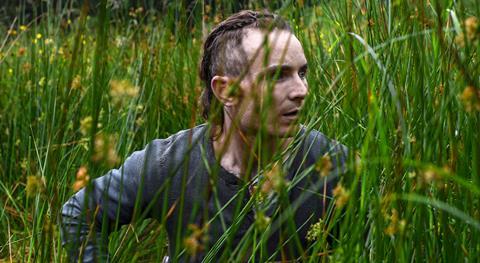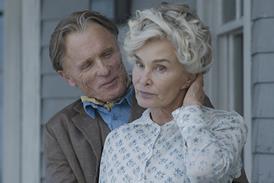Dir/sc: Stephen Fingleton. UK. 2015. 105mins

The Survivalist is a spare, foreboding thriller about a near-paranoid thirty-ish isolate scratching a subsistence living in a Northern Ireland forest following the disintegration of organised society. His fears for his life are justified when a suspicious mother and daughter, then a band of armed pillagers, come seeking his provisions. Not least because the climactic skirmishes are visceral and unvarnished, Northern Irish filmmaker Stephen Fingleton’s gripping feature debut serves as a bracing antidote to the Hunger Games and Divergent school of lavish “dystopian’ sci-fi tent-poles.
All three performances are superb, but as the prematurely white-haired mother, an inventive mistress of wood lore, Olwen Fouéré is formidable.
If commercial prospects are unpromising for a cautionary tale that allows only the faintest light to fall on mankind’s dwindling time on earth, the BFI and Northern Ireland Screen-backed movie shouldn’t lack for suitors among enterprising arthouse and indie distributors following its Tribeca Film Festival premiere. One drawback is that the sound is occasionally muffled and the actors’ broad Northern Irish accents are hard to understand. One selling point is Fingleton’s discreet rendering of the sexual relationship between the raw-boned protagonist, played by Martin McCann, and the enigmatic daughter, Milja, played by Mia Goth. Fingleton fleetingly paired the two in Magpie (2014), his 16-minute dry run for The Survivalist. Though Goth’s partial nudity will provoke equal prurience and criticism, it’s neither gratuitous nor eroticised, any more than is McCann’s. The neo-primitivist context helps: love in the time of post-capitalist meltdown sheds its artificial trappings.
In terms of its spartan but poetic visual storytelling and minimal sentimentality (and dialogue), The Survivalist suggests the Derry-born Fingleton is a major discovery. That extends to his thematic concerns. Both SLR (2013) – his acclaimed short drama about the warping influence of internet pornography on the male psyche – and Magpie share an interest in the disordering effect images of attractive, anonymous young women have on sexually frustrated men. If Fingleton’s gaze is partially fixed on the so-called “male gaze,” he seems less concerned with intellectualising or politicising it than depicting its primal consequences.
The animated bar graph borrowed from Magpie that opens The Survivalist – placing it in the realm of futuristic docudrama – shows how population growth rocketed in the peak years of oil production and plummeted when oil was exhausted, eradicating the industrial food supply. Because the ecology has endured, the hut-dwelling hero has been able to plant and harvest meagre crops such as berries in his garden and has sustained his joyless hermetic existence thus for seven years, his brother having died mysteriously. With shotgun and mantraps, Survivalist, as he’s named in the credits, kills and buries interlopers after going through their pockets.
Self-sufficiency only goes so far, however. A snapshot of a desirable woman that Survivalist finds on one of his victims triggers a long-repressed yearning. He’s unable to resist the siren call of sex when middle-aged nomad Kathryn (Olwen Fouéré) and 18-ish Milja barter for food – the mother making it clear the girl will sleep with him in exchange for it. Subsequently persuaded against his better instincts to let them live with him and help in the garden, he relaxes his guard and is nearly killed for his trust. Yet when outsiders wound him, the women heal him, using an ancient aboriginal practice at one point. The complex relationships between the three take a decisive turn as the emotionally strongest of them starts to call the shots. All three performances are superb, but as the prematurely white-haired mother, an inventive mistress of wood lore, Fouéré is formidable. A “witch” through necessity, she re-invents that cinematically depleted archetype and makes it something genuinely strange.
Murkily beautiful thanks to Damien Elliott’s naturally lit cinematography, The Survivalist calls to mind other films, though that may be due more to osmosis than the magpie in Fingleton himself. Andrei Tarkovsky’s Stalker (1979) is the key stylistic analogue, and there are thematic connections to Jim McBride’s post-apocalyptic Glen and Randa (1971) and John Hillcoat’s The Road (2009).
When Survivalist dreams about or recalls his dead brother, there appears a haunting slow-mo sequence vaguely reminiscent of pioneer motion photographer’s Eadweard Muybridge’s 1880 Nude Man Running. When Survivalist stalks the raiders in the woods, his stealth suggests the various big and small-screen Robinson Crusoes who eliminate the pirates who have landed on his island. Meanwhile, Survivalist’s roach hairstyle clearly (if erroneously) puts him in the company of the Woodland Indians of the American North-east, as depicted in Michael Mann’s The Last of the Mohicans (1992). In the interests of reverse continuity, however, hair designer Dana Kalder may have been inspired by the red “Mohawk” sported by the Clonycavan Man, the Iron Age bog body found in County Meath, Ireland, in 2003.
Production company: The Fyzz Facility
International sales: K5 Media Group, www.k5international.com
Producers: Wayne Marc Godfrey, Robert Jones, David Gilbery
Production design: Dick Lunn
Cinematography: Damien Elliott
Editor: Mark Towns
Main cast: Martin McCann, Mia Goth, Olwen Fouéré
























